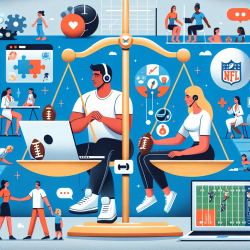Transforming Care: Lessons from the NFL for Speech Language Pathologists
In the world of professional sports, the health and well-being of athletes are paramount. Yet, as highlighted in the research paper titled A Proposal to Address NFL Club Doctors’ Conflicts of Interest and to Promote Player Trust, the dual loyalty of club doctors to both the team and the player can create significant ethical challenges. This issue is not unique to the NFL; it resonates across various fields, including speech language pathology, where practitioners often balance the interests of multiple stakeholders.
For speech language pathologists, especially those working in school settings, understanding and addressing potential conflicts of interest is crucial for delivering ethical and effective care. The NFL study proposes a structural shift to address these conflicts, advocating for the separation of roles to ensure that players receive unbiased medical care. This approach can serve as a valuable model for speech language pathologists aiming to enhance their practice.
Implementing Ethical Practices in Speech Language Pathology
Here are key takeaways from the NFL proposal that can be applied to speech language pathology:
- Clear Role Definition: Just as the NFL suggests separating player care from club interests, speech language pathologists should clearly define their roles and responsibilities. This includes establishing boundaries between administrative duties and direct client care to ensure that therapeutic decisions are made solely in the best interest of the child.
- Transparency and Communication: Open communication with all stakeholders, including parents, teachers, and administrators, is vital. Practitioners should ensure that all parties are informed about the child's progress and any potential conflicts of interest that may arise.
- Empowered Autonomy: Encourage children and their families to be active participants in the therapy process. Provide them with the information and tools they need to make informed decisions about their care, similar to how the NFL proposal emphasizes player autonomy.
- Ethical Oversight: Establishing an independent review committee, akin to the proposed NFL medical committee, can help oversee ethical practices and address any conflicts of interest within the school setting.
Encouraging Further Research
While the NFL's approach offers a promising framework, further research is needed to tailor these strategies to the unique challenges faced by speech language pathologists. Practitioners are encouraged to engage in research initiatives that explore the impact of conflict-free care models on therapy outcomes.
In conclusion, the insights from the NFL study underscore the importance of ethical practices and conflict-free care in achieving optimal outcomes for clients. By adopting these principles, speech language pathologists can enhance their practice and ensure that the needs of children remain at the forefront of their work.
To read the original research paper, please follow this link: A Proposal to Address NFL Club Doctors’ Conflicts of Interest and to Promote Player Trust.










